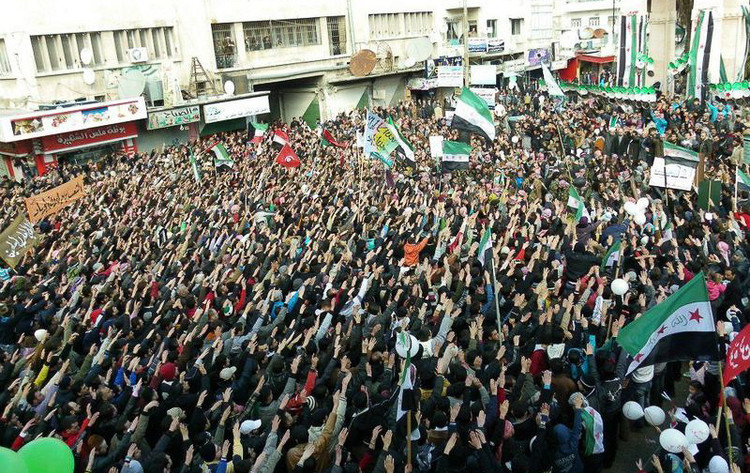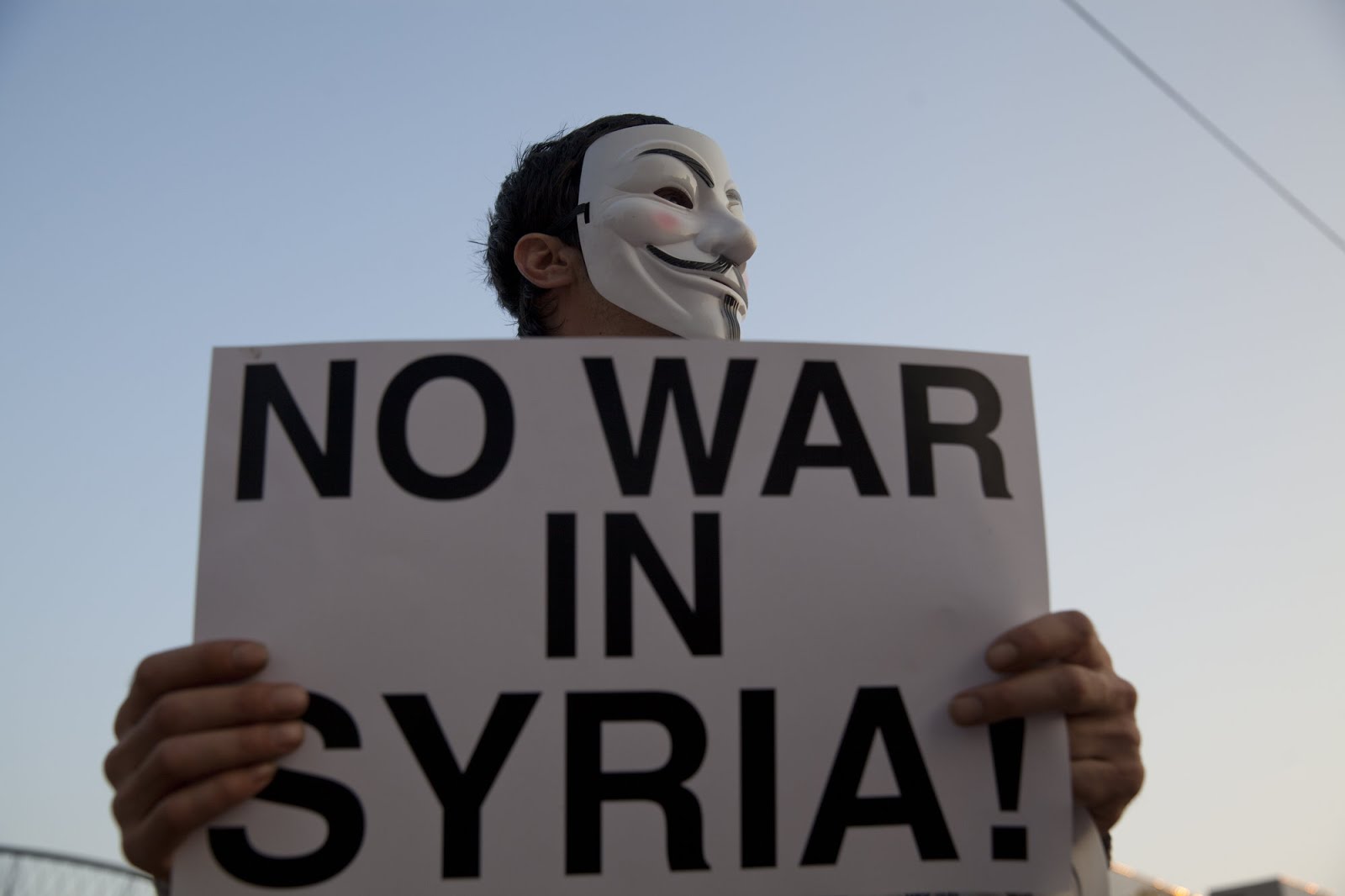To Intervene, or Not Intervene: That is the Question
By Sid Miller
The civil war taking place in Syria has become one of the most critical issues observed by the international community. Although it is not another country’s responsibility to intervene, nevertheless with the rising violence occurring in Syria, the United States may need to intervene militarily. The reason behind this is that Syria is in control of chemical weapons which disobeys Chemical Weapons Convention enacted by the U.N, in addition, there are valid reasons, despite all of this, that the U.S should not get involved because attacks could result in mass civilian casualties, escalation and reprisal of the Syrian army, an attack on Israel, or the fall of Assad being replaced by chaos or something worse. Furthermore, since Iran has been supporting Assad through the revolution and attempting to maintain order in Syria, the situation may be out of the hands of the U.S.
http://blogs.reuters.com/great-debate/files/2013/05/syria-bashar.jpg
Syria, once the center of the Islamic Caliphate, has seen occupations an invasions over the decades from the Romans and the Mongols to the Turks and the Crusaders. Syria gained its independence from France in 1946, yet continued to see periods of political instability from conflicting views of different religious and ethnic groups. From 1958 to 1961 it unified with Egypt, until a military coup intervened and restored independence. By 1963, the nationalist Baath party took control. This soon was taken and has since been under control by a small organized Shiite Muslim group of military leaders (BBC, "Syria Profile"). Within 2011 to 2012 a series of anti-government protests inspired by the Arab Spring in Egypt, Libya, and Tunisia erupted.
“Syrians voiced their unhappiness with the stagnant political process and were advocating for democratic reforms. These protests did not go over well with the government, which responded with extreme measures including the kidnapping, torture and killing of protesters. Government troops began opening fire on civilians, who fired back in response” (Wiersema, "Everything You Need to Know About the Syrian Civil War").
Soon after, the uprisings began to take a more formal course when the opposition began organizing political and military support preparing for a long term uprising. By the end of 2012 the anti-government uprisings had developed into a full on civil-war (BBC, "Syria Profile"). 
http://jewishnewsreport.com/wp-content/uploads/2013/12/157.jpg
Currently the situation in Syria has not made much progress resolving the demands made by the protestors or creating a peaceful resolution process. The violence caused by the civil war has led to entire towns and neighborhoods being destroyed (Wiersema, "Everything You Need to Know About the Syrian Civil War"). Recently, allegations have been made about the use of chemical weapons against civilians and has sparked serious contemplation of intervention from the international community (BBC, "Syria Profile").
“Further international sanctions were imposed amid the bloody repression of protests in the descent into civil war. By December 2012 the US, Turkey, Gulf states, France and Britain had recognised the main opposition National Coalition of the Syrian Revolution as the "sole legitimate representative of the Syrian people", signalling their belief that the Assad government is beyond redemption” (BBC, "Syria Profile").
The longevity of Assad’s regime has been doubted since the start of the uprisings in 2011. Volunteer rebel fighters residing from various countries amongst the middle east have joined the Syrian rebels in their fight for political reform; some because they want democratic political change, and others who have religious opposition to Assad's secular regime (Wiersema, "Everything You Need to Know About the Syrian Civil War").
http://flashtrafficblog.files.wordpress.com/2013/03/syria-womanwithbloodyface.jpg
According to the Geneva Protocol of 1925, the use of chemical and biological weapons in war is prohibited ("UNODA - 1925 Geneva Protocol"). On August 21, 2013 the United Nations Mission reported that they had collected clear and convincing evidence of the use of Chemical Weapons against civilians in a large area of Damascus (Abdelaziz et al., "U.N. Confirms Use of Chemical Weapons in Syria").
“The OPCW has yet to release the details of the declaration, leaving the size of Syria's arsenal subject to speculation.But experts believe the stockpile, considered to be one of the world's largest, contains the blister agent sulphur mustard, the nerve agent sarin, and the more potent and persistent nerve agent VX” ("Syria's Chemical Weapons Stockpile")
With the knowledge of Chemical Weapons being possessed and used in Syria, the United Nations have set a deadline for June 30, 2014 for the full destruction of all of Syria’s Chemical Weapon inventory. It is now up to the Syrian government to move all of their chemicals from 12 different storage sites around the country to the city of Latakia. From there the chemicals will be transported to different locations in and along the Mediterranean Sea where they will be destroyed. Support has come from Russia, China, Denmark, Norway, Finland, Italy, and the U.S in the disposal of the Chemical Weapons (Gardner, "Syria Chemical Weapons: Time Running out for Destruction").
Although the chance for a diplomatic resolution seems likely with the current agreement that the United States will not intervene if Syria removes its Chemical Weapons. Nevertheless if the peaceful solution fails, U.S response may be necessary (Jacobson, “Why We Must Intervene in Syria, A Veteran Makes the Case). Currently President Obama has stated that he has “not made any decisions”, but if intervention were to be the case it would be “limited, and narrow”. With the impending threat to our allies in the surrounding area such as Israel, Jordan, and Turkey, the decision to intervene will be critical for the near future ("Obama: 'I Have Not Made a Decision' on Syria"). While Obama has stayed on neutral terms with his opinion to intervene, Secretary of State John Kerry believes that the need for intervention is necessary immediately as a form of punishment to Assad for his crimes. As President Assad has already crossed the ‘red line’ by the illegal use of Chemical Weapons, this has been seen by many as a threat to our national security and the security of our allies, thus giving reason as to why we may need to intervene (Jacobson, “Why We Must Intervene in Syria, A Veteran Makes the Case).
On the contrary even though the U.S feels obliged to intervene due to the ramifications of Syria’s illegal possession of Chemical Weapons, the consequences could be more damaging. Intervention may cause a much larger chain reaction throughout the Middle East. This would be especially detrimental if Syria were to get the support from its allies such as Hezbollah and Iran, creating an even larger threat to our allies. "When you do a military strike it often has ramifications you don't anticipate" said Dan Byman, a senior fellow of foreign policy at Brookings Institute (Wiersema, "Everything You Need to Know About the Syrian Civil War"). In addition, apart from Chemical Weapons the U.S does not have any real interest in Syria. Therefore we would be intervening with no goal; as the civil war has been going on for years, why would we intervene now apart from our interest of our national security. Furthermore, we cannot financially afford another war with our increasing debt. Overall the decision to intervene in Syria is not in our best decision, especially with the blowback ramifications such as the possibility of immediate attacks on our allies in Israel (Tate, “11 Reasons Not to Intervene in Syria).
. 
Furthermore, the Islamic Republic of Iran has been a large supporter of President Assad through the regime. “Iran has been providing essential military supplies to Assad, primarily by air” (Fulton, Wyer, “Iranian Strategy in Syria). One of the main reasons Iran has been occupying certain areas of Syria has been so that if Assad were to fall Iran could then pursue its regional interests. Iranian Security and Intelligence forces have been instructed to support Assad and the Syrian Army, their efforts and support have rapidly expanded since 2012 (Fulton, Wyer, “Iranian Strategy in Syria). Iran has been another key player in the decision to intervene in Syria. If we were to engage in Syria, chances are we would end up engaging with Iran to. Yet the support of Iran is not all bad, it has increased the chance that Syria has for resolution. Along with that, this support increases the chance that the situation may be worked out on its own and will not require military intervention (Tate, “11 Reasons Not to Intervene in Syria).
http://www.vosizneias.com/wp-content/uploads/2010/07/red41.jpg
As the civil war in Syria continues its bloody path, the U.S has been faced with serious decisions whether or not to implement military action in efforts to protect our national security home and abroad. With the rising levels of violence and the knowledge of Chemical Weapons many have began sitting on the edges of their seats in lieu of the decision to intervene or not. Yet with the current situation and lack of better reason, it may be a more intelligent course that the U.S does not get involved in Syria. If the current plan to remove the Chemical Weapons is implemented, the civil war will not be something we will to get involved in and may work itself out. As the President stated, if the removal of Chemical Weapons fails, the U.S will have to make another decision inevitably supporting the idea of military involvement.
Work Cited
Abdelaziz, Salma, Hala Gorani, Mariano Castillo, Jim Sciutto, and Mick Krever. "U.N. Confirms Use of Chemical Weapons in Syria." CNN. Cable News Network, 12 Dec. 2013. Web. 13 Apr. 2014.
Blodget, Henry. "AMBASSADOR SAMANTHA POWER: This Is Why The US Must Attack Syria." Business Insider. Business Insider, Inc, 09 Sept. 2013. Web. 12 Apr. 2014.
"FIVE QUESTIONS: RICHARD NORTON ON AFTER THE ARAB SPRING." Foreign Policy Association. Foreign Policy Association, n.d. Web. 12 Apr. 2014.
Fulton, Will, Joseph Holliday, and Wyer Sam. "Iranian Strategy in Syria." Institute for the Study of War. The Insitute for the Study of War, n.d. Web. 11 Apr. 2014.
Gardner, Frank. "Syria Chemical Weapons: Time Running out for Destruction." BBC News. BBC, 10 Apr. 2014. Web. 12 Apr. 2014.
Jacobson, Mark R. "Why We Must Intervene in Syria, a Veteran Makes the Case." The Daily Beast. Newsweek/Daily Beast, 10 Sept. 2013. Web. 12 Apr. 2014.
Klein, Ezra. "10 Things That Could Go Very Wrong If We Attack Syria." Washington Post. The Washington Post, 05 Sept. 2013. Web. 12 Apr. 2014.
"Obama: 'I Have Not Made a Decision' on Syria." YouTube. YouTube, 28 Aug. 2013. Web. 13 Apr. 2014.
Rosen, Nir. "Syria: The Revolution Will Be Weaponised - Features - Al Jazeera English." Al Jazeera English. Al Jazeera, 23 Sept. 2011. Web. 12 Apr. 2014.
"Syria Profile." BBC News. BBC, 19 Mar. 2014. Web. 12 Apr. 2014.
"Syria." Syria. Polling Report, n.d. Web. 12 Apr. 2014.
"Syria's Chemical Weapons Stockpile." BBC News. BBC, 30 Jan. 2014. Web. 13 Apr. 2014.
Tate, John. "11 Reasons Not to Intervene in Syria." Campaign for Liberty. Campaign For Liberty, 30 Aug. 2013. Web. 13 Apr. 2014.
"UNODA - 1925 Geneva Protocol." UN News Center. UN, n.d. Web. 12 Apr. 2014.
"UNODA - Chemical Weapons." UN News Center. UN, n.d. Web. 13 Apr. 2014.
"US President Barack Obama in 'red Line' Warning to Syria over Chemical Weapons." YouTube. YouTube, 21 Aug. 2012. Web. 13 Apr. 2014.
Wiersema, Alisa. "Everything You Need to Know About the Syrian Civil War." ABC News. ABC News Network, 31 Aug. 2013. Web. 10 Apr. 2014.
Zisser, Eyal. "SPRING 2013 VOLUME XX: NUMBER 2." Can Assad's Syria Survive Revolution?
Middle East Forum, Spring 2013. Web. 12 Apr. 2014.
No comments:
Post a Comment